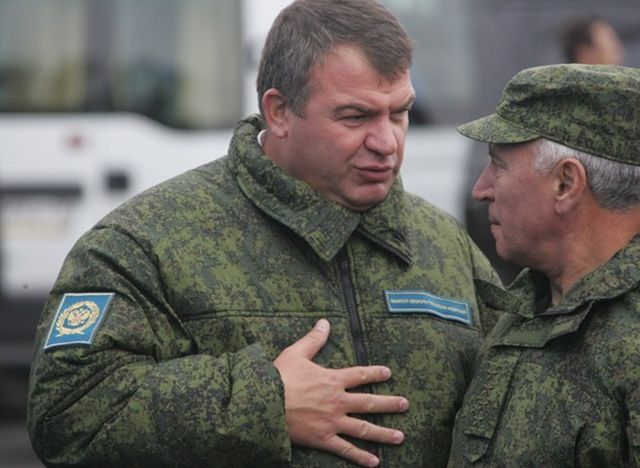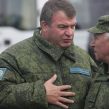
New Russian Strategic Level Commanders: Makarov’s Successor in the Making?
Publication: Eurasia Daily Monitor Volume: 7 Issue: 149
By:

On July 22, Russian Defense Minister, Anatoliy Serdyukov, signed an order appointing acting commanders in the new operational-strategic commands (OSK’s). Serdyukov’s Press Secretary, Lieutenant-Colonel Irina Kovalchuk, told Interfax that Colonel-General Arkadiy Bakhin (Commander of the Volga-Urals Military District –MD) has become the acting Commander of the West OSK; Lieutenant-General Aleksandr Galkin (Commander of the North Caucasus MD) will command the South OSK; Admiral Konstantin Sidenko (Commander of the Pacific Fleet) now commands the East OSK and Lieutenant-General Vladimir Chirkin (Commander of the Siberian MD) commands the Central OSK (Interfax, July 22).
These appointments are highly significant for a number of reasons linked to the future course of Serdyukov’s reform program, and not least in strengthening the authority of the Chief of the General Staff (CGS), Army-General Nikolai Makarov. Each of these commanders are committed supporters of the “new look” and share common features in their career progression, especially Bakhin, Galkin and Chirkin, and these are arguably now possible candidates to replace Makarov in the future.
General Makarov was appointed as the CGS in June 2008, prior to the Russia-Georgia war in August of that year. At the time of his appointment he was 58 years old. Upon reaching the retirement age for an officer of his rank, 60, in October 2009, President Dmitry Medvedev, signed a ukaz extending his service by up to three years, partly in recognition of his crucial role in promoting and overseeing the implementation of military reform (Interfax, October 13, 2009). Consequently, by 2012, Makarov must be replaced; however, since the defense “tandem” that formed between Serdyukov and Makarov has worked so well and proved critical in advancing the military reform, the selection of the latter’s successor must also be handled very carefully.
In December 1997, Makarov was appointed as commander of the ground and coastal troops and deputy commander of the Baltic Fleet. By September 1999 Makarov was the chief of staff in the Moscow MD before becoming the commander of the Siberian MD in December 2002. Following a period as chief of armaments (April 2007) Makarov became the CGS on June 3, 2008. As a candidate of political sciences, his dissertation topic was: “Political Extremism as a Radical Model of the Political Process, and the Organization of State Opposition to Extremism” (Kommersant-Vlast, March 5, 6). Makarov will be 61 in October 2010, allowing a maximum of two years to select his successor.
Makarov’s only obvious similarity to Admiral Sidenko is the latter’s experience commanding troops and forces in Northeastern Russia in the late 1990’s. However, in the case of the other senior appointments, there are more clear indications of shared background and preference for those with service in the Siberian MD. General Bahkin, 54, in the 1990’s served as a commander of the 59th Motorized Rifle Regiment in the 85th Motorized Rifle Division (MRD) in the Siberian MD. Following a period as commander of the 102nd Military Base in Gyumri, Armenia, in 2000 he commanded the 42nd MRD in Chechnya. In 2002, Bakhin was appointed as deputy commander of the North Caucasus MD. In October 2004, he returned to the Siberian MD, commanding the 41st Combined-Arms Army in Novosibirsk, before becoming deputy commander of the Siberian MD in January 2006 (serving as Makarov’s deputy) and later its chief of staff. On December 3, 2008 he was appointed to command the Volga-Urals MD (Kommersant-Vlast, March 5, 6).
In 2003, General Galkin, 52, served as deputy commander of the 41st Combined-Arms Army (Novosibirsk), then as the chief of staff of the 36th Combined-Arms Army (Borzya, Chita Oblast) in the Siberian MD, before he became commander of the 41st Army in January 2006. In April 2008, Galkin was appointed as deputy commander of the Siberian MD, and following Makarov being promoted to the post of CGS in December 2008, Galkin was made its chief of staff. On January 11, 2010, Galkin was appointed as the new commander of the North Caucasus MD (Kommersant-Vlast, March 5, 6).
General Chirkin, 54, was chief of staff in the 19th MRD in the North Caucasus MD before commanding the 42nd MRD in Chechnya in 2000. By 2002, Chirkin was the chief of staff in the 58th Army within the same MD, before his appointment the following year to command the 36th Combined-Arms Army in the Siberian MD. He served from February 2007 as deputy commander of the Moscow MD, and in December 2008 became chief of staff in the Volga-Urals MD. On January 11, 2010, he was promoted to command the Siberian MD (Kommersant-Vlast, March 5, 6).
However, Bakhin, Chirkin and Galkin all benefitted during Makarov’s period commanding the Siberian MD. They are all outspoken supporters of Serdyukov’s reform, and the preference for those with experience in the Siberian MD was demonstrated in January 2010, in the largest reshuffling of generals since Serdyukov’s reform began (Argumenty Nedeli, January 22). These appointments confirm the high level of influence that Makarov has secured over the defense minister, favoring only those senior officers committed to the progress of the reform, and given the expansion of command responsibilities involved in forming the new OSK’s by December 1, 2010, it is likely that these generals will now compete to replace Makarov in 2012. Those confirmed in their posts in December will remain in the running, while given the intensification of Chirkin’s pro-reform interviews this year, as well as having commanded the Siberian MD, the others may have already identified a front runner.




